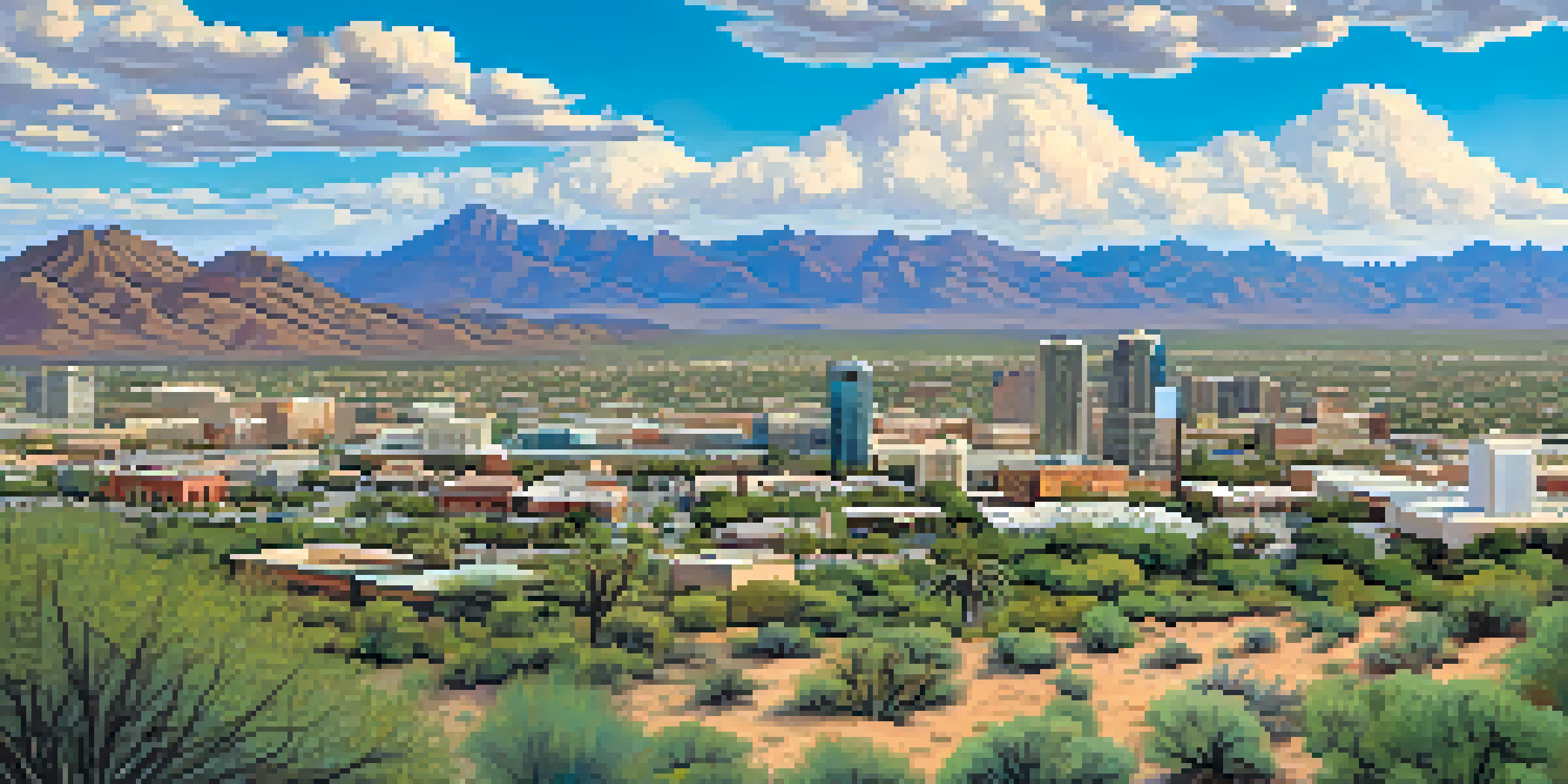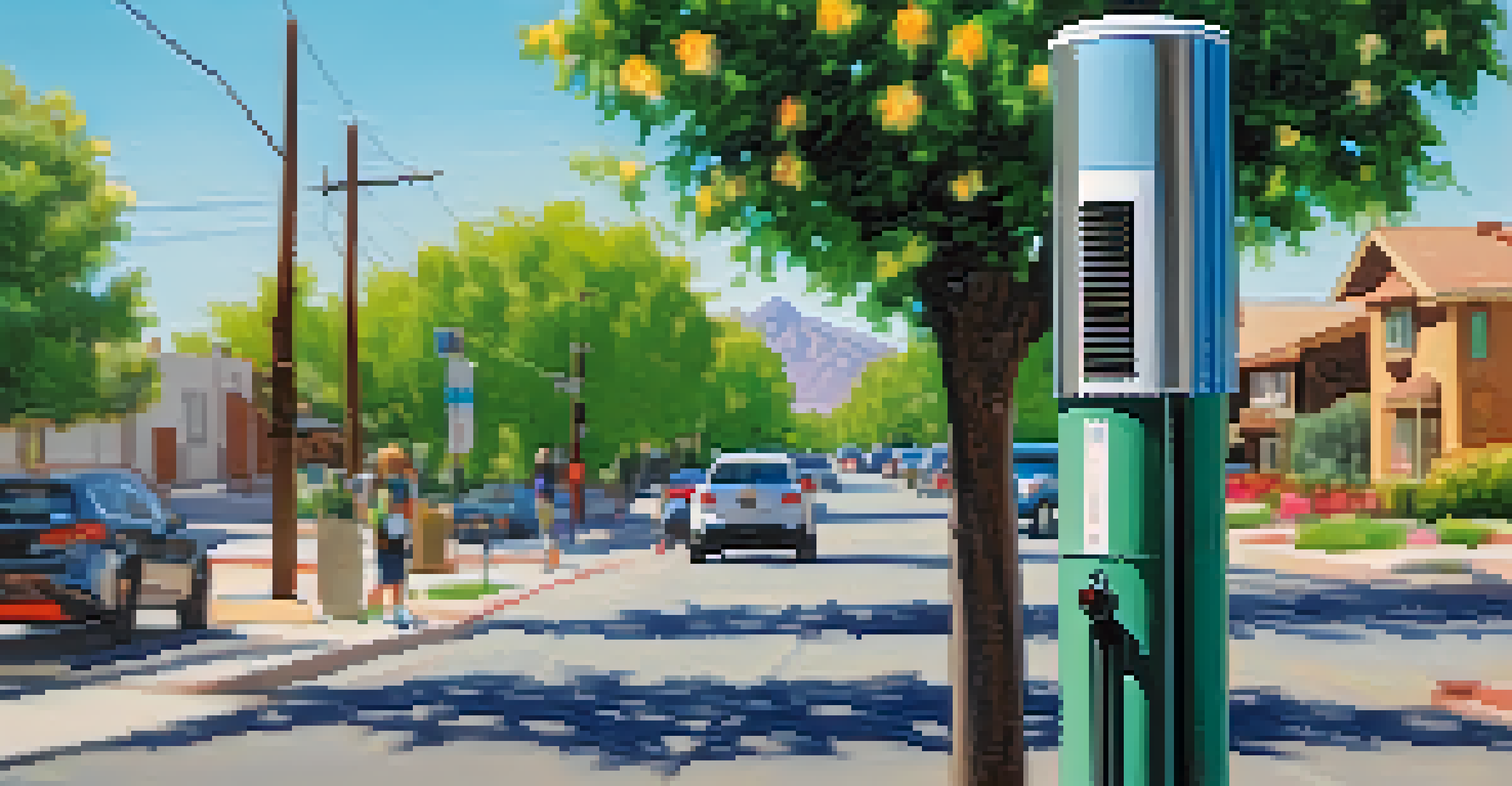Tucson's Air Quality Initiatives and Environmental Justice

Understanding Tucson's Air Quality Challenges
Tucson, nestled in the Sonoran Desert, faces unique air quality challenges. Factors like dust storms, vehicle emissions, and industrial activities contribute to air pollution. These elements can lead to health issues, especially for vulnerable populations, making it crucial to address them effectively.
The environment is where we all meet; where we all have a mutual interest; it is the one thing all of us share.
The city's geography plays a significant role in its air quality. With mountains surrounding the valley, pollutants can become trapped, leading to higher concentrations of harmful substances. This situation underscores the need for comprehensive strategies to combat pollution and promote cleaner air.
Recognizing these challenges, Tucson has embarked on various initiatives to monitor and improve air quality. By understanding the sources and impacts of pollution, the city can develop targeted solutions that benefit all residents, particularly those most affected.
Key Initiatives for Improving Air Quality
Tucson has launched several initiatives aimed at enhancing air quality throughout the region. One notable program focuses on reducing vehicle emissions by promoting public transportation and cycling. By encouraging residents to opt for greener modes of travel, the city is working to decrease the number of vehicles on the road.

Another initiative involves the planting of trees and the creation of green spaces, which play a vital role in filtering air pollutants. The city’s Urban Forestry program aims to increase the tree canopy, providing shade and improving overall air quality. These efforts not only beautify the city but also contribute to healthier living conditions.
Tucson's Air Quality Challenges
Tucson faces significant air quality issues due to factors like dust storms and vehicle emissions, particularly affecting vulnerable populations.
Additionally, Tucson collaborates with local organizations to raise awareness about air quality issues. Educational campaigns inform residents about the importance of reducing pollution and how they can contribute. By fostering community involvement, the city is building a collective responsibility towards cleaner air.
The Role of Environmental Justice in Air Quality Efforts
Environmental justice is a fundamental aspect of Tucson's air quality initiatives. This concept emphasizes that all communities, regardless of their socio-economic status, should have equal access to a healthy environment. In Tucson, this means addressing the disproportionate impact of air pollution on marginalized communities.
What we are doing is not only a matter of public health. It’s a matter of justice.
Tucson recognizes that low-income neighborhoods often bear the brunt of pollution due to their proximity to industrial sites and heavy traffic areas. By focusing on these areas, the city aims to implement targeted strategies that enhance air quality and protect vulnerable populations from health risks associated with pollution.
The city also engages with community members to ensure their voices are heard in decision-making processes. Through public forums and collaborations, Tucson seeks to empower residents to advocate for their environmental rights, creating a more equitable approach to air quality management.
Community Engagement and Public Awareness Campaigns
Community engagement is vital to Tucson's air quality initiatives. The city actively involves residents in discussions about air quality challenges and solutions. This approach not only fosters a sense of ownership but also ensures that initiatives are tailored to the specific needs of the community.
Public awareness campaigns play a crucial role in educating residents about air quality issues. Tucson utilizes various platforms, from social media to local events, to spread information about the importance of clean air and how individuals can contribute. This proactive approach encourages community members to adopt practices that reduce pollution.
Community Engagement Matters
Active community involvement and public awareness campaigns are essential for addressing air quality challenges and fostering local stewardship.
Moreover, partnerships with local schools and organizations enhance these efforts. Educational programs designed for students and community groups help instill a sense of environmental stewardship from a young age. By nurturing this mindset, Tucson is cultivating a generation that values and prioritizes air quality.
Collaboration with State and Federal Agencies
Tucson's air quality initiatives benefit significantly from collaboration with state and federal agencies. These partnerships enable the city to access resources, expertise, and funding, enhancing the effectiveness of local programs. Working together, they can implement comprehensive strategies that address air quality on a broader scale.
State agencies often provide valuable data and research that inform Tucson's initiatives. This collaboration ensures that local actions align with regional and national air quality standards. By leveraging this support, Tucson can better track its progress and adapt its strategies as needed.
Additionally, Tucson participates in federal programs aimed at improving air quality. Through initiatives like the Environmental Protection Agency's Air Quality Grants, the city gains access to financial resources that bolster its efforts. This cooperative approach ensures a unified front in the fight for cleaner air.
Innovative Technologies for Monitoring Air Quality
Innovative technologies are transforming Tucson's approach to monitoring air quality. The city has invested in advanced air quality sensors that provide real-time data on pollution levels. This technology allows residents to stay informed about air quality conditions, helping them make informed decisions.
These sensors are strategically placed throughout the city, capturing data in various neighborhoods. This localized approach ensures that the information reflects the unique air quality challenges faced by different areas. By understanding these variations, Tucson can tailor its initiatives to address specific needs effectively.
Collaborative Efforts for Cleaner Air
Tucson collaborates with state and federal agencies to enhance air quality initiatives and access vital resources for effective implementation.
Moreover, the data collected from these sensors is made available to the public, promoting transparency and community engagement. Residents can access this information through online platforms, fostering a sense of accountability. This technological integration empowers Tucsonans to take an active role in improving air quality.
Future Directions for Tucson's Air Quality Initiatives
As Tucson looks to the future, it remains committed to enhancing air quality and promoting environmental justice. The city plans to expand existing programs and explore new initiatives that address emerging challenges. This proactive stance ensures that Tucson continues to adapt to changing environmental conditions.
Future directions may include further investments in renewable energy sources and sustainable transportation options. By prioritizing clean energy, Tucson can significantly reduce its carbon footprint and improve air quality. Additionally, expanding public transportation will encourage more residents to opt for eco-friendly travel alternatives.

Moreover, Tucson aims to strengthen its partnerships with community organizations and residents. By amplifying local voices in decision-making, the city can ensure that its initiatives are inclusive and effective. This collaborative approach will be crucial in fostering a healthier, more equitable environment for all.